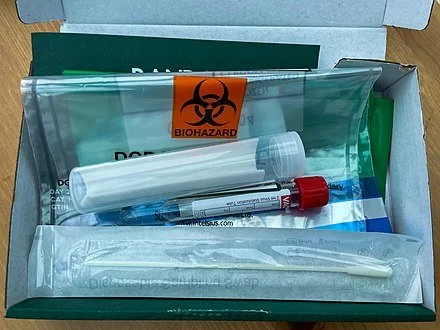Chris Powell: $75 million could be spent better; stop hysteria over COVID home testing
COVID-19 home test kit.
MANCHESTER, Conn.
Connecticut Gov. Ned Lamont could have found worse things to do with the $75 million in federal emergency aid he ordered distributed last week as a bonus to poor households receiving the state's earned-income tax credit. On average those households probably have suffered more financially from the long virus epidemic, since many of their breadwinners hold, or held, the service-sector jobs that were the first to be cut back or eliminated.
Complaints from Republicans that the bonuses mainly will reward a constituency of the governor's party, the Democrats, as his re-election campaign begins are not so compelling. For nearly everything government does rewards some political constituency, and state law already had identified the earned income tax credit constituency as deserving. If Connecticut ever again has a Republican administration, it will be unusual if Republican-leaning constituencies -- if only ordinary taxpayers -- are not rewarded too.
The governor's dispensing that $75 million is troublesome for different reasons, starting with the disregard for democratic procedure.
The governor's office says the federal law that sent the emergency money to the state authorizes his administration to spend it on expenses incurred because of the virus epidemic. But the state has been paying its earned income-tax-credit obligations all along. No payments by the government were cut because of the epidemic. While many recipients surely suffered losses because of the epidemic, it's unlikely that all did, and no one receiving the bonus will have to show evidence of such losses. The expenses to be reimbursed here are merely being assumed.
Additionally, $75 million is a lot of money for state government to dispense out of the blue at the command of just one official, an amount never formally appropriated by the General Assembly. Indeed, as Republican legislators note, state law already had determined how much was to be spent on the tax credit. The bonus created by the governor overrides that legislation.
Since he still exercises -- at least until February -- emergency powers to rule Connecticut by decree, the governor presumably could have rewritten the tax-credit law by himself to authorize the bonus. But he did not do so, perhaps because it might have emphasized his gathering unnecessary power to himself.
Republican legislators note that Connecticut faces many other compelling needs apart from those of the tax-credit recipients and that ordinary democracy first would have summoned the legislature or legislative leaders to discuss how to spend the $75 million. That's why the governor's high-handedness here is another argument for letting his emergency powers expire.
Having continued for two years, the virus epidemic is no longer an emergency. While the epidemic will wax and wane as epidemics do, government is fully aware of what combating it may require. Most of all, combating it may require more medical facilities and staff, and thus, to finance them, fewer raises for government employees, fewer stupid imperial wars and that $75 million that instead will be spent to expand the tax credit.
That money might build a few hospital wards and hire more doctors, nurses, and auxiliary staff. It might buy and distribute antivirals and vitamins.
If the tax-credit bonus can be construed as an expense of the epidemic, surely expanding medical capacity and services could be construed similarly. With so much free money flowing from Washington, the federal government probably wouldn't object if Connecticut chose to get more relevant.
After all, unlike the tax-credit bonus, increasing medical capacity might benefit everyone who got sick.
Meanwhile government's frantic efforts to distribute home testing kits for the virus and the public's frantic efforts to obtain them seem misplaced.
Surely quite without a test most people can tell if they are sick with symptoms like those attributed to the virus, and surely most people with such symptoms might have enough sense to get to a doctor or hospital quickly, especially since early treatment of the virus is crucial to defeating it.
The people lately waiting in long lines for a home test kit for the virus well may be putting themselves at greater risk of contracting it. The virus is bad enough. Test hysteria induced by government will make it worse.
Chris Powell is a columnist for the Journal Inquirer, in Manchester.
